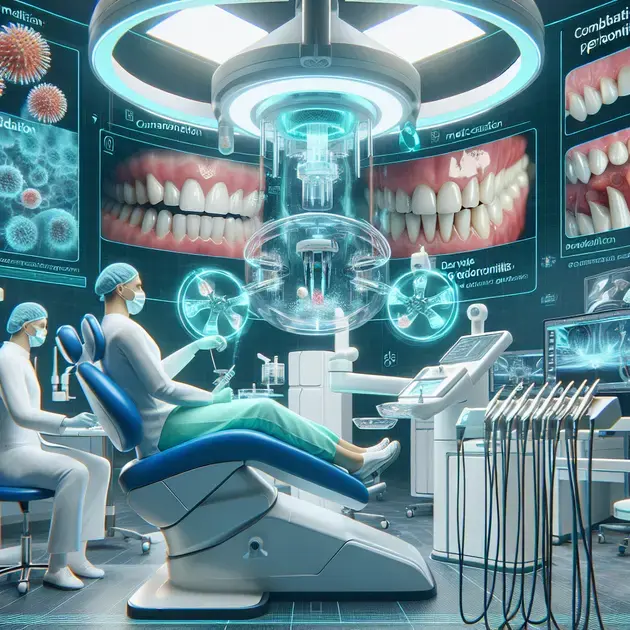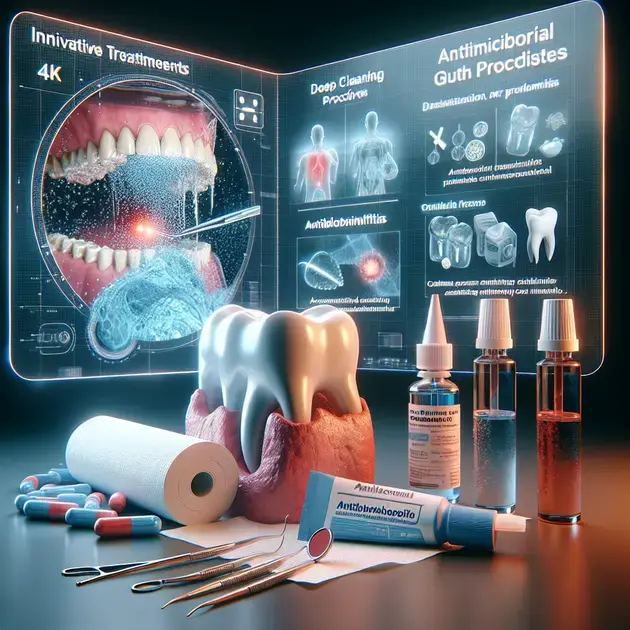Periodontitis, a severe gum infection that can lead to tooth loss, affects millions of people worldwide. In this comprehensive guide, we will discuss effective medication options to combat periodontitis and improve oral health.
Recent studies have shown that a combination of antibiotics and deep cleaning procedures can be highly effective in treating periodontitis. By following the recommendations outlined in this guide, individuals can take proactive steps towards managing and overcoming this common dental condition.

Medication Options for Periodontitis Treatment
When it comes to treating periodontitis, there are various medication options available to help combat the infection and improve oral health. One common medication is antibiotics, which can be prescribed by a dentist or periodontist to fight the bacterial infection causing periodontitis. These antibiotics can come in the form of pills, mouth rinses, or gels, and are often used in combination with other treatments such as deep cleaning procedures.
If you are prescribed antibiotics for periodontitis treatment, it is important to follow your dentist’s instructions carefully. Make sure to take the medication as directed, for the full duration prescribed, even if your symptoms improve before you finish the course. Skipping doses or stopping the medication early can lead to antibiotic resistance and a recurrence of the infection.
In addition to antibiotics, deep cleaning procedures such as scaling and root planing can also be effective in treating periodontitis. During these procedures, a dental hygienist or periodontist will remove plaque and tartar from below the gumline, helping to reduce inflammation and promote healing. Deep cleaning is often performed in conjunction with antibiotic therapy to achieve the best results.
To find more information about medication options for periodontitis treatment, consult reputable dental websites such as the American Academy of Periodontology (perio.org). These sites provide detailed information on various treatment options, including antibiotics and deep cleaning procedures, to help you make informed decisions about your oral health.
The Power of Antibiotics and Deep Cleaning Procedures
Antibiotics and deep cleaning procedures are powerful tools in the fight against periodontitis, a serious gum infection that can lead to tooth loss if left untreated. Antibiotics work by targeting the bacteria causing the infection, helping to reduce inflammation and promote healing in the gums. They can be prescribed in various forms, such as pills, mouth rinses, or gels, depending on the severity of the infection.
Deep cleaning procedures, including scaling and root planing, are essential for removing plaque and tartar buildup below the gumline. This process helps to smooth out the root surfaces of the teeth, making it more difficult for bacteria to adhere and cause further infection. Deep cleaning is often recommended in conjunction with antibiotic therapy to address both the cause and symptoms of periodontitis.
To take proactive steps towards improving your dental health, schedule regular dental check-ups and cleanings with a qualified dental professional. By staying on top of your oral hygiene and following your dentist’s recommendations for treatment, you can help prevent periodontitis and maintain a healthy smile for years to come.
Taking Proactive Steps Towards Dental Health
Preventing periodontitis and other dental issues starts with good oral hygiene practices and regular dental care. Brushing your teeth at least twice a day, flossing daily, and using an antiseptic mouthwash can help remove plaque and bacteria from the mouth, reducing the risk of gum disease. Additionally, scheduling regular dental check-ups and cleanings can catch any issues early and prevent them from progressing into more serious conditions like periodontitis.
In addition to oral hygiene, maintaining a healthy lifestyle can also contribute to better dental health. Eating a balanced diet, limiting sugary foods and drinks, and avoiding tobacco products can all help reduce the risk of gum disease and other oral health problems. Drinking plenty of water and chewing sugar-free gum can also promote saliva production, which helps to neutralize acids and protect the teeth.
For more information on taking proactive steps towards dental health, consider using dental health apps such as “My Dental Care” or websites like the American Dental Association (ada.org). These resources offer tips and tools to help you improve your oral health habits and stay on track with your dental care routine.

Effective Antibiotic Regimens for Managing Periodontitis
Periodontitis is a common oral health condition that can be effectively managed with the use of antibiotic regimens. These regimens typically involve a combination of antibiotics that target the bacteria responsible for the infection. By effectively controlling the bacterial growth, antibiotics can help reduce inflammation and promote healing of the gums.
One of the most commonly used antibiotics for managing periodontitis is doxycycline. This antibiotic is known for its effectiveness in targeting the specific bacteria that cause gum disease. It can be taken orally or applied directly to the affected areas, depending on the severity of the infection.
In addition to doxycycline, other antibiotics such as metronidazole and amoxicillin are also used in combination therapy for periodontitis. These antibiotics work synergistically to combat the bacterial infection and reduce the symptoms associated with the condition.
It is important to note that antibiotic regimens should always be prescribed by a qualified dentist or periodontist. Proper dosage and duration of treatment are crucial to ensure the effectiveness of the antibiotics and to minimize the risk of antibiotic resistance.
In conclusion, antibiotic regimens play a crucial role in managing periodontitis by targeting the underlying bacterial infection. When used in combination with good oral hygiene practices, antibiotics can help improve gum health and prevent the progression of gum disease.
The Role of Antimicrobial Mouthwashes in Periodontitis Treatment
Antimicrobial mouthwashes are a valuable adjunct to periodontitis treatment, as they can help reduce the bacterial load in the mouth and promote gum health. These mouthwashes contain active ingredients such as chlorhexidine, cetylpyridinium chloride, or essential oils that have been shown to be effective in controlling the growth of bacteria.
When used as part of a comprehensive oral hygiene routine, antimicrobial mouthwashes can help reduce plaque buildup, prevent gingivitis, and support the healing of inflamed gums. They can be particularly beneficial for individuals with chronic periodontitis who may be more prone to recurrent infections.
It is important to follow the instructions provided by the manufacturer when using antimicrobial mouthwashes. Some mouthwashes may need to be diluted with water before use, while others should be swished around the mouth for a specific duration before spitting out.
While antimicrobial mouthwashes can be effective in controlling bacterial growth, they should not be used as a substitute for regular brushing and flossing. These mouthwashes are most effective when used in conjunction with a good oral hygiene routine and regular dental visits.
In summary, antimicrobial mouthwashes can play a valuable role in periodontitis treatment by reducing bacterial load and promoting gum health. When used correctly, these mouthwashes can help support overall oral health and contribute to the management of gum disease.
Innovative Approaches to Combating Periodontitis with Medication
Recent advancements in dental research have led to the development of innovative approaches for combating periodontitis with medication. One such approach involves the use of local drug delivery systems, where antibiotics or antimicrobial agents are directly administered to the affected areas of the gums.
These local drug delivery systems can help target the infection more effectively and reduce the systemic side effects associated with oral antibiotics. By delivering medication directly to the site of infection, these systems can achieve higher concentrations of the drug where it is needed most.
Another innovative approach to combating periodontitis involves the use of probiotics, which are beneficial bacteria that can help restore the balance of oral microbiota. Probiotic supplements or mouthwashes containing beneficial bacteria can help support the growth of healthy bacteria in the mouth and suppress the growth of harmful bacteria that cause gum disease.
Furthermore, researchers are exploring the use of host modulation therapy for periodontitis, which involves targeting the host response to infection rather than just the bacteria themselves. Medications that modulate the inflammatory response in the gums can help reduce tissue destruction and promote healing of the periodontal tissues.
Overall, these innovative approaches to combating periodontitis with medication hold promise for more targeted and effective treatments for gum disease. By leveraging the latest advancements in dental research, dentists and periodontists can provide patients with tailored treatment options that address the root causes of periodontitis and promote long-term gum health.
Conclusion
Effective management of periodontitis relies on antibiotic regimens to target the bacterial infection causing gum disease. Antibiotics like doxycycline, metronidazole, and amoxicillin work synergistically to combat the infection and reduce associated symptoms. It’s crucial that these regimens are prescribed by qualified dental professionals to ensure proper dosage and treatment duration, minimizing the risk of antibiotic resistance.
Antimicrobial mouthwashes, containing active ingredients like chlorhexidine and essential oils, are valuable additions to periodontitis treatment. They help reduce bacterial load, support gum health, and prevent plaque buildup and gingivitis. When used alongside regular oral hygiene practices, these mouthwashes can contribute significantly to managing gum disease.
Furthermore, innovative approaches like local drug delivery systems and probiotics offer targeted solutions for combating periodontitis. Direct administration of antibiotics to affected gum areas reduces systemic side effects, while probiotics help restore oral microbiota balance. Host modulation therapy, targeting the host response to infection, shows promise in reducing tissue destruction and promoting gum tissue healing.



